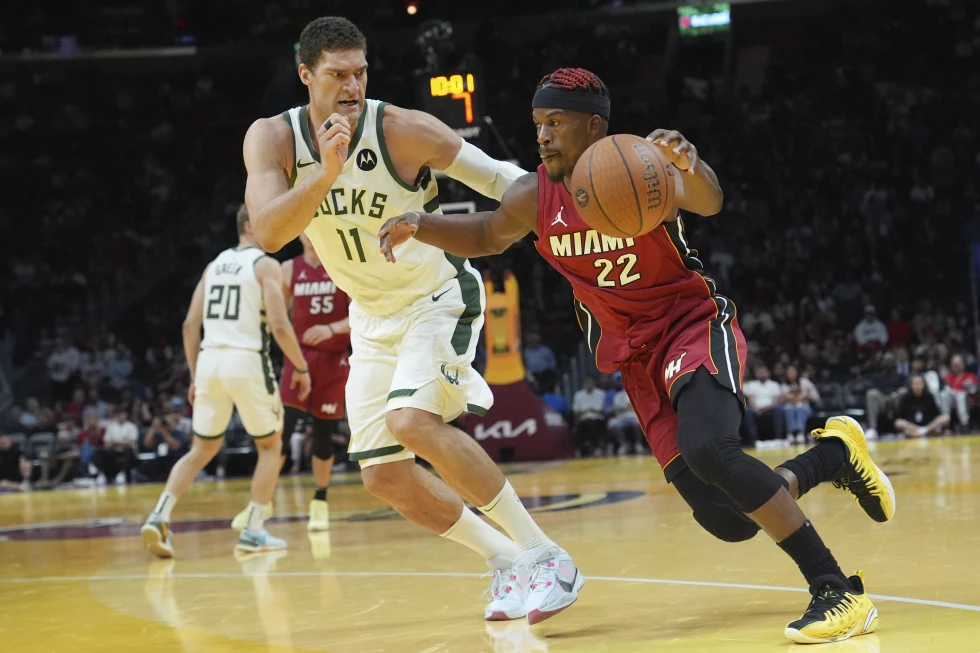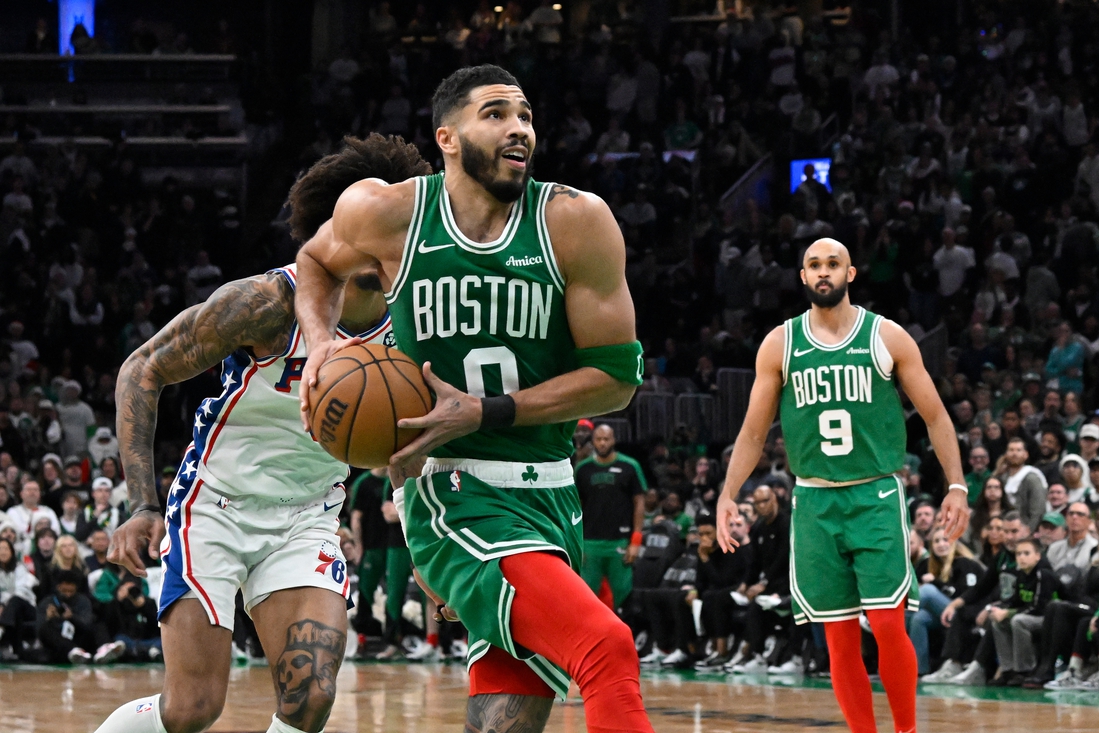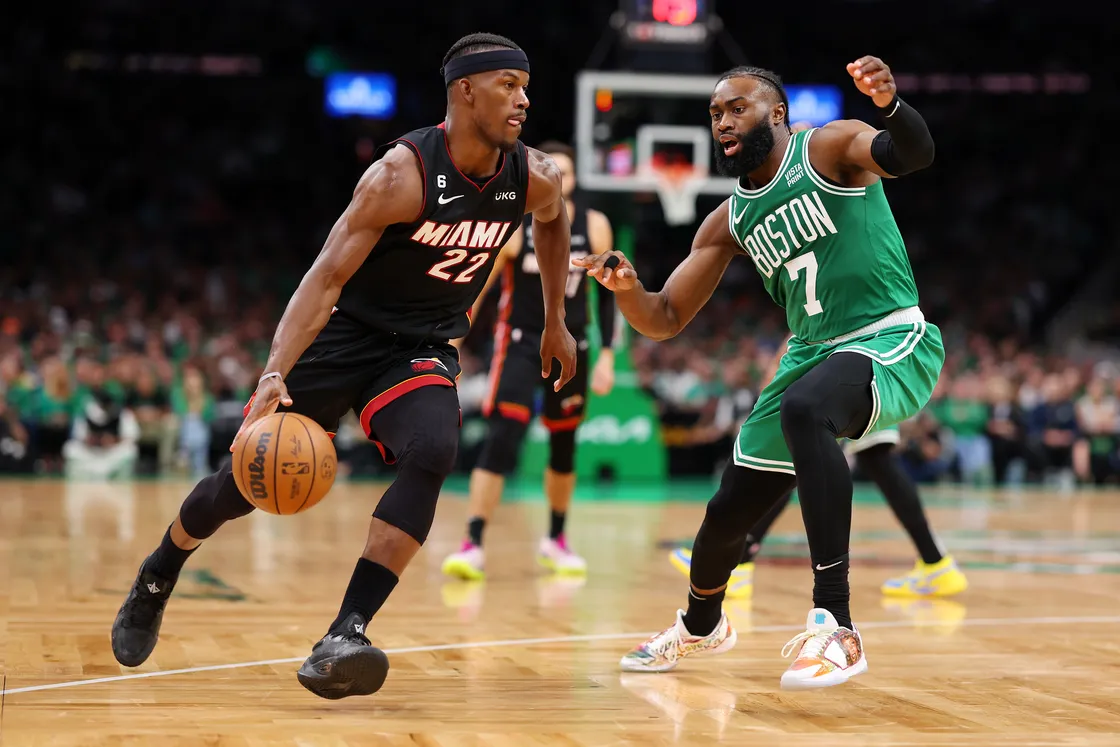This article looks at the possibility of a Jimmy Butler trade to the Boston Celtics, exploring how it could help on the court, the financial impacts, and the potential consequences for the Celtics’ future decisions.
Jimmy Butler nearly joined the Celtics twice before.
The first time was in 2011, during his draft, when then-President of Basketball Operations Danny Ainge almost selected him. Instead, Ainge chose JaJuan Johnson after a trade with the Nets. A few years later, Ainge had the chance to trade for Butler using draft picks that became Jaylen Brown and Jayson Tatum. But Butler never ended up with the Celtics… at least, not yet.
Recently, reports have suggested that Jimmy Butler wants to leave Miami, seeking a team where he can compete for a championship. The Boston Celtics could be a good option for him, and from his point of view, this might be the perfect opportunity.
You might wonder how and why the Celtics could trade for Butler and if it’s worth taking a chance on the 35-year-old forward. Let’s explore this idea further.
How it could happen The Celtics are in the second apron, meaning they can’t trade multiple players to match salaries or take on more salary than they already have. This would likely result in a simple swap of Jaylen Brown for Jimmy Butler, possibly with some draft picks coming from the Miami Heat to the Celtics. Right now, the Heat only have two picks available (for 2030 and 2031), but they could adjust their offer.
Why it might make sense on the court The Celtics have struggled in several areas this season, including:
- Generating free throws (21st in the league)
- Getting to the rim (28th in the league)
- Forcing turnovers (23rd in the league)
- Creating transition opportunities (25th in the league)

Jimmy Butler is strong in all these areas.
Offensively, he’s great at getting to the rim. This season, half of his shot attempts have been at the rim, and he makes 70% of those shots, despite Miami’s average spacing. Imagine how effective he could be with the Celtics’ elite spacing.
He’s also excellent at drawing fouls, earning shooting fouls on 23% of his attempts—better than stars like Joel Embiid or Giannis Antetokounmpo. This could help the Celtics’ offense when their outside shots aren’t falling. For context, Butler averages 1.31 points per shot attempt, compared to 1.10 for Jaylen Brown.
Defensively, the Celtics have had trouble forcing turnovers and creating transition opportunities. Butler’s ability to read the game and disrupt passing lanes would be a big help. He’s also great at pressuring ball handlers and forcing steals.
In transition, while the Celtics would miss Brown’s ability to finish, Butler’s playmaking would make up for it. Statistically, Butler could turn many of the Celtics’ current weaknesses into strengths.
However, the Celtics would lose Jaylen Brown’s defense against opposing superstars. While Butler could help in other areas, it’s uncertain if he could slow down players like Luka Dončić as much as Brown did in the NBA Finals.
That said, players like Jrue Holiday or Jayson Tatum could take on the task of guarding superstars, while Butler focuses on off-ball defense and making plays.
As for whether Butler would fit in with the Celtics, his usage rate is lower than Brown’s, and his skills in driving and posting up would work well within the Celtics’ system. He wouldn’t get in the way of their offense.
And remember, Jaylen Brown recently mentioned that the Celtics “hunt seals” on offense, which Butler excels at.
Why it might make sense financially The Celtics’ financial situation is complicated. They are in the second apron and are expected to stay there next season. There are penalties for staying in the second apron for three years within a five-year period, including automatically moving their first-round draft pick to the end of the round.
The Celtics have five players making over $30 million annually for the next two years. Trading away Jrue Holiday’s contract is tricky, Derrick White’s deal is too valuable to move, and Kristaps Porziņģis, who provides important spacing and rim protection, has an injury that lowers his trade value. At some point, the Celtics might have to decide between their two stars, Brown and Tatum.

Trading for Butler might offer a way out of that situation, though it could be premature. His expiring contract could give the Celtics financial flexibility in the near future while keeping them competitive.
But what will happen after that? Will Butler want to leave the Celtics? Will his next contract be too expensive for the Celtics to handle? Butler is 35, and while his best years are behind him, Brown’s peak has yet to come.
Could trading for Butler improve the Celtics’ financial situation, or would it create even bigger problems, especially with a player who has been tough to keep happy in the past?
What about the intangibles? Aside from basketball and finances, how would the Celtics’ players and coaches react to such a major move? The current success of the team is built around Jaylen Brown and Jayson Tatum—how would the team adjust if one of the “Jay’s” was traded away?
And would the Celtics be able to integrate Butler into the team after years of facing him as an enemy? Trading for him could create tension, as it would be difficult for the front office to deal Jaylen Brown for Butler, especially considering the Celtics’ current roster chemistry.
There are concerns that Butler wouldn’t fit well with the Celtics, given the recent trade of their longest-tenured player. It’s uncertain if Brad Stevens would break up a team he worked hard to put together.
However, a potential Butler trade serves as a reminder that difficult decisions are on the horizon. On top of the financial challenges, the Celtics are currently for sale. This trade could make the team’s financial situation more appealing to potential buyers.
While such a major trade might not make sense this season, it could set the stage for what’s to come.
